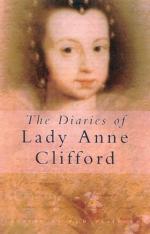|
This section contains 3,761 words (approx. 13 pages at 300 words per page) |

|
SOURCE: Lamb, Mary Ellen. “The Agency of the Split Subject: Lady Anne Clifford and the Uses of Reading.” English Literary Renaissance 22, No. 3 (Autumn 1992): 347-68.
In the following essay, Lamb discusses Clifford as a “split subject”—an aristocratic heir as well as a woman who refused to be subordinated to male authorities.
One of the most significant activities of current critics has been the dismantlement of the transcendental or essentialist subject. Despite ideological differences, various orientations, such as Marxism, feminism, cultural materialism, and New Historicism, have seen a presumed political neutrality of the transcendental subject as a mask for self-interested efforts to maintain a white, male, upper-class status quo.1 Revealing the transcendental subject to be both inaccurate and duplicitous, recent critics have increasingly provided a sense of specificity among subjects, who are seen to be shaped by cultures distant from this one in space or time. Their sense of...
|
This section contains 3,761 words (approx. 13 pages at 300 words per page) |

|


